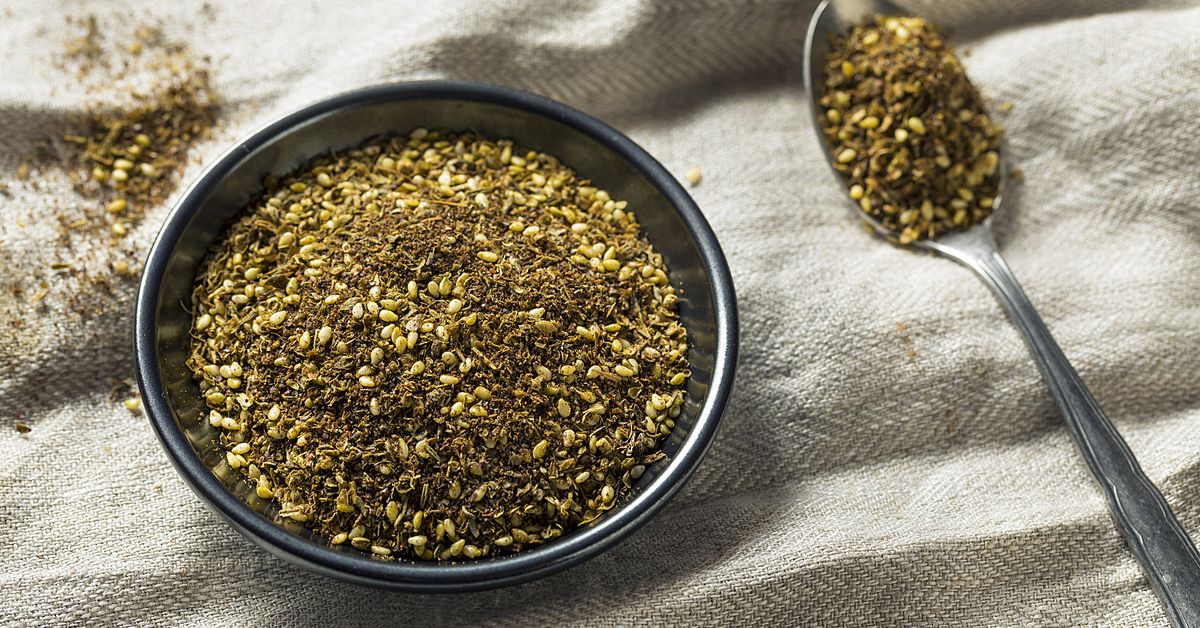Zaatar, the beloved topping of Lebanon’s Manoushe, is an indispensable condiment to any Lebanese pantry. You’ll find it rolled in a sandwich for school lunch, sprinkled over labneh for a quick snack, and traveling by the bag-full in the luggage of any expatriated Lebanese. As the love of Zaatar spread across continents, the local supply chain has expanded to accommodate the demand, leaving agri-food producers with room for innovation and new markets to explore.
The oregano variety used in Lebanon’s traditional Zaatar mix is called Origanum Syriacum, a wild shrub that grows in the mountains of Palestine, Jordan, Lebanon, and Syria. It’s the preferred variety to top the Manoushe because, when baked, the leaves release their oils and aromas for the distinguished, much sought-after Zaatar flavor.
Conventionally, our ancestors foraged the herb in the wild before the practice of planting it became increasingly common in the last 30 years. The Lebanese zaatar mix is made from the flower of the oregano plant and its leaves, dried and crushed then mixed with sumac, sesame, and salt, the quantity of each remains debatable for every region and home.
Premium and Low-grade Zaatar
Yet, no Zaatar is born equal. Premium Zaatar has earned its name from being created in the same traditional fashion our ancestors practiced: wait till the Origanum plant is in full bloom, and handpick the leaves, a labor-intensive task with a limited yield. From there the quality of mixes available in the market go down to have almost no oregano in them. A low-grade Zaatar mix will include 10 to 40% of different oregano varieties while the rest is made of fillers such as bran, dried lettuce, sesame hulls, stems, died sawdust instead of sumac, flavored with citric acid.
Fady Aziz, Founder of the Good Thymes, affirms that this has put him on a mission to create a readily-available, price-accessible product made from real thyme to counter the forged mixes in the market through a project that he is working to implement with the Food System Challenge Program. The Good Thymes originally sells premium Zaatar that Fady plants in the Kfarhoune mountains, South of Lebanon, and produces in the same laborious method as his grandparents. The project started as a form of escape for Fady from his desk job, quickly evolving into a fast-growing startup with selling points around the world.
“We work to innovate products around Zaatar using readily available raw ingredients. Sourcing locally allows us to support micro-businesses and prove that we can create many products with raw materials coming from our land as an alternative to condiments and seasonings that are imported,” explains Fady. From the traditional zaatar mix, he’s created a range of innovative mixes, and then grew his lines to include flavored salt, herbal infusions, liquid soap, spirits, and chili sauce, all based on zaatar.”
The potential of Lebanon’s wild herbs
With the success of innovative projects like the Good Thymes, the number of farmers working in thyme has been on the rise, but also as a result of the economic crisis that has threatened the country’s food security and left its people scrambling for sources of income.
Fady sees the surge in Zaatar production as a response to the rise in international demand, he additionally notes that farmers fail to identify market gaps in high-revenue products such as sumac for example, a spice also native to the Lebanese mountains, and essential in any zaatar mix. “In that respect, they lack proper guidance but also prefer quick gain as sumac requires a longer time investment.”
The wild plants and herbs of Lebanon are also a valuable commodity for a rapidly growing market: essential oils. Cedarwood, lavender, rosemary, wild mint, peppermint, sage, and thyme are some of the plants that are used as raw materials for the pharmaceutical and cosmetics industries. “The challenge,” explains Fady, “is that these industries are highly regulated, while local production does not follow export standards, let alone, correct extraction methods leaving a potentially dangerous product in the local market.” Fady is working with experts on developing the process to create a high-grade consumable oil from the Origanum Syriacum.
Tackling Export Markets
The lack of information and regulation stands between Lebanese farmers and achieving their best export potential. Information is not easy to find or not available for export standards and regulations for zaatar and spices. “All the work that has been done is based on personal initiatives and personal effort with no real planning or vision set at a country level. Because of the of lack regulation on what is being produced and exported, we are gaining a bad reputation in multiple countries. One incident can blacklist the whole production of a country,” details Fady as his export activities started shortly before the pandemic and gained momentum in the last three years. His products are available in Europe, the US, the UK, and the GCC.
The large Lebanese base around the world helps promote Lebanese zaatar and how it is consumed, although each culture has adapted it to its own cuisine. Zaatar has gained momentum as a vegan product and people are more curious about using it. “We look for buyers who understand the value of fine food or delicatessen food because we have positioned our brand in this category. We are always looking for fine food or delicatessen food distributors that have the experience of introducing the product into their communities.”
Zaatar remains one of the many ingredients in the Mediterranean pantry that deserves its place in the world markets, for its culinary uniqueness, nutritional value, propagation of culture, and also for the economic impact it has on the Lebanese producers.
The Food System Challenge
The Food System Challenge is implemented by the World Food Programme (WFP) and Berytech through support from the German Federal Ministry of Economic Cooperation and Development (BMZ).
The program’s main outcomes are enhanced food security, a well-functioning local food system, enhanced efficiency and resilience of cooperatives and SMEs working across different streams of the food systems, and increased employment opportunities, especially for women and vulnerable individuals.










